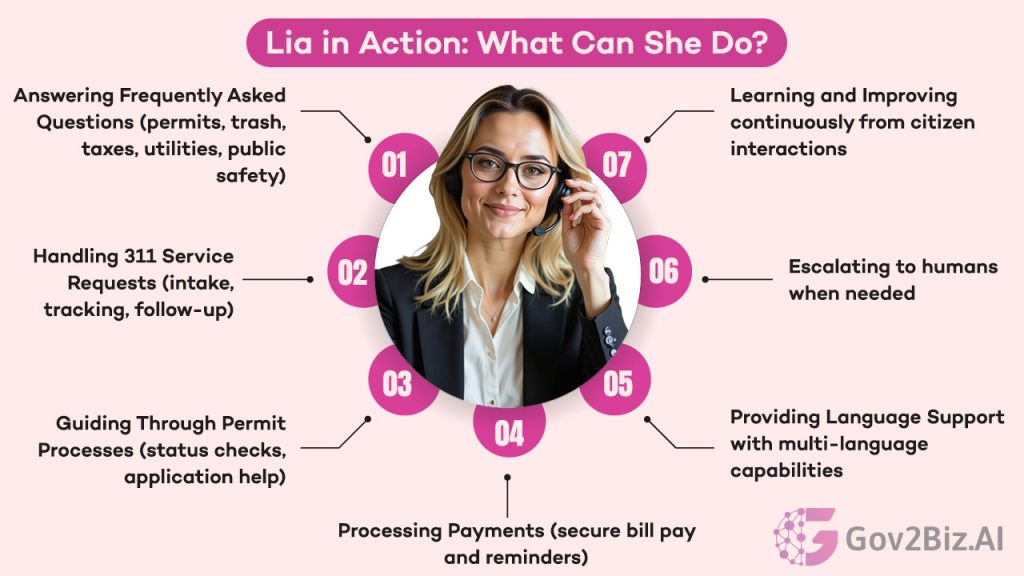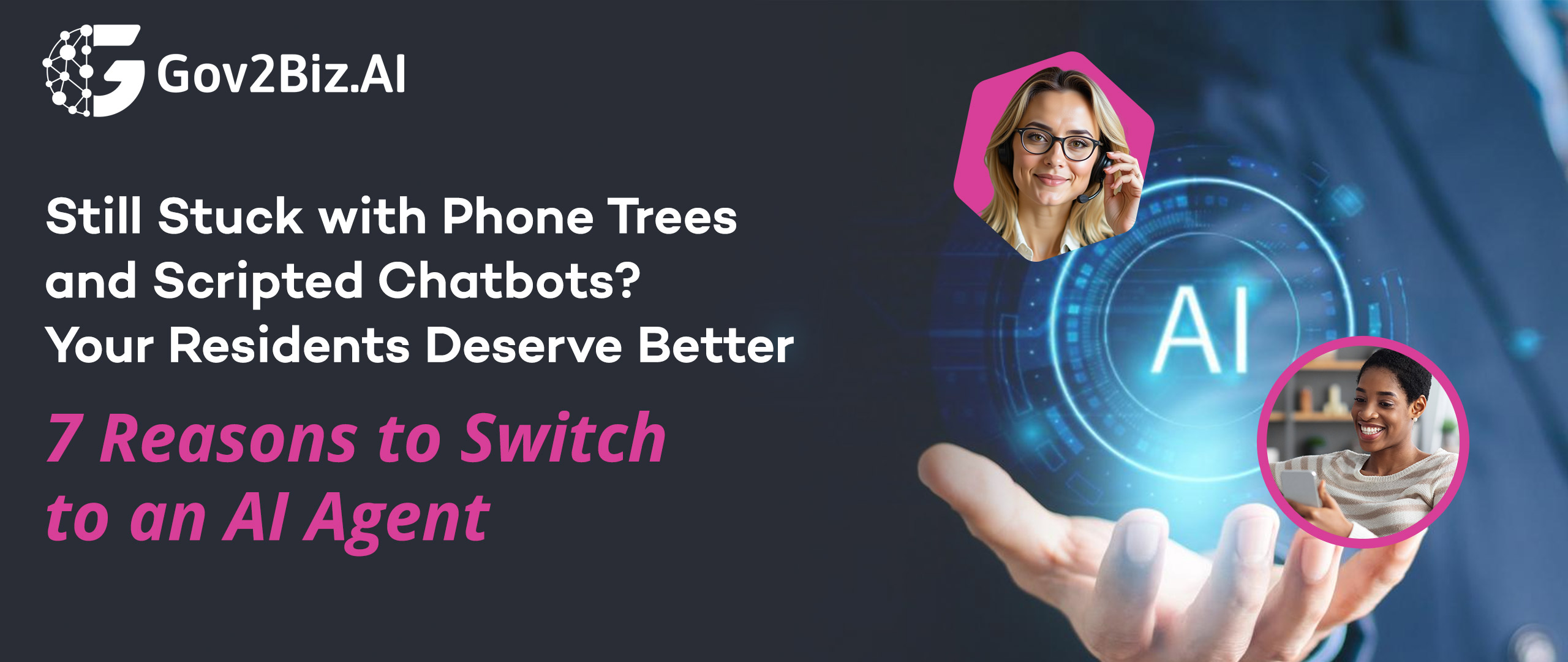Call Centers, Outdated IVRs, & Basic Chatbots—Here’s Why They No Longer Work
Every day, your city is bombarded with resident questions: “When’s trash pickup?” “How do I renew my permit?” “Can I pay this fine online?”
The goal is always the same – fast, accurate, and accessible service. But if your city is still relying on phone trees, voicemail boxes, and manual call handling, it’s an uphill battle.
So far your only answers have been “manning the phone”, or clunky IVR menus. Then came chat bots who only seem to say one thing – “I am sorry, I don’t know the answer to that”.
Residents are underwhelmed, and staff are overwhelmed.
That’s why more cities are turning to AI-powered agents. Lia is an intelligent agent, built specifically for local government, that handles calls, chats, and even transactions 24/7, while freeing your staff for higher-value work. There are no call trees or press 1 for this and 2 for that or “let me transfer you to that department”. Straight up service.
The Case for Upgrading Local Government Support Systems with AI
So how do you know when it’s time to make the shift? Look for these signs:
1. Your Staff Is Stuck Answering the Same Questions All Day
Most city staff will tell you: a huge chunk of their day is spent repeating the same answers.
- “How do I renew my permit?”
- “When is bulk trash day?”
- “Where can I pay my fine?”
It’s important information — but it’s not a good use of skilled staff time.
With an AI Agent: Common questions get answered instantly, using natural language (no menus or scripts), across voice, SMS, web chat, or email. Your staff can finally focus on inspections, case management, and community programs instead of fielding the same inquiries on repeat.
2. Residents Are Complaining About Long Wait Times
Nobody likes waiting on hold. But during billing cycles, storm clean-ups, or tax season, call volumes often surge by 30–50%. Traditional IVRs and phone queues can’t scale, so hold times stretch to 10+ minutes and call abandonment rates hit 40%.
With an AI Agent: Residents don’t wait. AI assistants can handle multiple calls and chats at once, around the clock, so citizens get fast, accurate answers — and your team isn’t buried in callbacks.
3. Your City Is Only “Open” 9 to 5
Missed calls after hours can mean missed payments, delayed permits, and frustrated residents who end up visiting City Hall in person (which adds even more work for staff).
With an AI Agent: Your city is available 24/7. Residents can ask questions, process requests, and even escalate urgent issues no matter when they reach out — whether it’s 3 PM or 3 AM.
4. Scaling Support Means Hiring More Staff
When your call volume spikes — from seasonal needs, weather events, or emergencies — the usual solution is to hire temporary staff or approve overtime. That’s costly and inefficient.
With an AI Agent: Support scales instantly, without new hires or infrastructure. Whether you’re a town of 5,000 or a city of 500,000, AI can handle demand seamlessly without ballooning costs.
Cities using AI assistants report 35–50% cost savings on citizen support by automating routine work, especially during seasonal peaks.
5. You’re Flying Blind on What Residents Really Need
With phone trees, IVR, and manual systems, it’s hard to know what’s really going on.
- Which services drive the most calls?
- How fast are issues resolved?
- Where are the service gaps?
Most legacy systems offer little or no reporting, which makes it harder to plan staffing, improve processes, or justify budgets.
With an AI Agent: Every interaction becomes actionable insight. You get real-time dashboards showing request types, resolution times, and satisfaction metrics — so you can see where to make improvements and where to invest.
6. Residents Expect More Than Just Phone Support
Today’s residents expect their government to work like their bank or favorite retailer. They don’t want to be limited to phone calls during business hours.
With an AI Agent: Citizens can connect however they prefer — voice, SMS, web chat, email, or even WhatsApp — without downloading apps or learning new systems. They get quick, convenient service, and your staff doesn’t get flooded by phone calls.
7. Your Chatbot Feels More Like a Wall Than a Helper
Many cities already have a chatbot on their website. But most are little more than glorified FAQ widgets. They can only answer simple, scripted questions, and anything more complex sends residents back to your phone lines — doubling staff workload.
An AI Agent:
- Handles multi-step, natural conversations — not just keyword matches.
- Processes real requests like payments, 311 service tickets, and permit lookups.
- Switches between chat and voice so residents choose their preferred channel.
- Learns and improves with every interaction, becoming more helpful over time.
Meet Lia: Your AI Front Desk Agent for Local Government
Lia is an AI agent designed specifically for local governments. Unlike generic chatbots or legacy systems, Lia combines deep government workflow knowledge with modern conversational AI. Here’s what sets her apart:
| Capability | IVR Call Trees | Manual Phone Systems | Basic Chatbots | Lia (AI Agent) |
|---|---|---|---|---|
| Availability | 24/7 (but only routes calls or records voicemails) | Business hours (voicemail after-hours) | 24/7, but text-only | 24/7, 365 days across voice, chat, text, and email |
| Channel Support | Voice-only | Voice-only | Web chat only | Voice, Web Chat, Email, WhatsApp |
| Resolution Speed | Slow — requires callbacks or transfers for most requests | Slow during busy times, long hold queues, voicemail backlog | Moderate — instant FAQ answers, but most issues escalate | Fast — resolves ~70% of inquiries instantly, routes complex issues to staff |
| Self-Service Capability | None — relies on staff for actual resolutions | None | Limited — FAQ and links only | Full — processes payments, 311 tickets, permit checks, FAQs, and routing |
| Language Understanding | Menu-driven, robotic (“Press 1 for…”) | Natural (human), but labor-intensive | Keyword-triggered, can’t handle multi-step questions | Conversational, understands multi-step requests and context |
| Citizen Experience | Frustrating menus, robotic tone, high abandonment rates | Friendly but long wait times and voicemail callbacks | Often frustrating (limited answers, frequent escalation) | Personalized, natural conversations across multiple channels |
| Staff Efficiency | Minimal — staff still handles most work | Heavy workload, especially during spikes | Minimal impact — escalates most issues | Frees 40%+ of staff time by automating high-volume, repetitive inquiries |
| Scalability | Can’t scale beyond limited phone lines/ports | Requires more hires or overtime to meet demand | Limited — can’t handle voice or complex requests | Instantly scales with demand, no new staff or infrastructure needed |
| Cost | Moderate (but scales poorly with call volume) | High — payroll, overtime, and infrastructure costs | Low (but limited impact, so savings are minimal) | 35–50% savings by automating most inquiries and reducing call volumes |
| Insights & Reporting | Minimal — basic call counts only | Minimal unless tracked manually | Basic usage stats (FAQ hits) | Real-time analytics on volume, response times, resolution rates, and satisfaction |
Lia in Action: What Can She Do?

Lia is trained to handle a wide range of citizen service needs, including:
- Answering Frequently Asked Questions (permits, trash, taxes, utilities, public safety)
- Handling 311 Service Requests (intake, tracking, follow-up)
- Guiding Through Permit Processes (status checks, application help)
- Processing Payments (secure bill pay and reminders)
- Escalating to humans when needed
- Providing Language Support with multi-language capabilities
- Learning and Improving continuously from citizen interactions
Ready to Serve Smarter? Get Started
If you recognize even one of these signs in your city, it’s time to consider a better approach. AI-powered front desk agents like Lia are already transforming service delivery for local governments across the country. Contact us to schedule a demo tailored to your local government’s needs and see how Lia can transform your citizen support experience.
👉 Request for a demo and 30-day free trial.











Leave a Reply